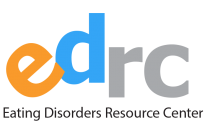In EDRC’s “Ask the Experts” online discussion series, Kathryn Hansen explains how prolonged dieting and brain chemistry overlap to cause bulimia and binge eating.
On December 9, 2020, Kathryn Hansen joins EDRC for a virtual discussion about how overcoming bulimia inspired her first book, Brain Over Binge (2011). Eating disorders are often attributed to underlying psychological issues, a byproduct of depression, or a traumatic childhood. However, Kathryn found that conventional counseling created rather than addressed a connection between food and coping with difficult feelings. The urge to binge and purge remained, no matter her mood.
What Is Binge Eating Disorder vs. Bulimia Nervosa?
Binge Eating Disorder (BED) is a potentially life threatening condition. Unlike bulimia, binge eaters do not voluntarily purge after consuming excessive portions of food in one sitting. BED is characterized by:
- Ingesting large quantities of food
- Eating much faster than normal
- Continuing to eat even when full
- Feeling distressed about bingeing
- Episodes once a week for 3 or more months
Binge eating is a core symptom of bulimia nervosa, an eating disorder that affects more than 1.5% of women and 0.5% of men over their lifetime. Food is often hoarded for future binge/purge cycles, and sufferers may alternate between bingeing and purging and long periods of restriction. Bulimia warning signs include:
- Drinking a large volume of liquid after meals
- Frequent bathroom trips during and after meals
- Wearing baggy clothes and avoiding swimsuits
- Consuming non-prescribed diuretics and laxatives
- Scars and calluses on the knuckles (Russell’s Sign)
- In advanced cases, poor oral health and chipped teeth
The Connection Between Dieting and Bingeing

In her discussion, Kathryn will explore two factors that drive the binge/purge cycle. First, prolonged dieting triggers the brain to enter survival mode and ramps up the body’s need for calories. Second, binge eating is dangerous for how it rewires the brain and alters our relationship with food over time. The brain becomes so habituated to the binge/purge cycle that bingeing seems normal, if not necessary for survival. Kathryn will offer tips to identify binge/purge triggers and break the cycle.
Kathryn is also the author of The Brain Over Binge Recovery Guide (2016). Developed with Amy Johnson, Ph.D., Katherine Thomson, Ph.D., and other experts in the field of disordered eating, this guide helps readers track the urge to binge and empower themselves.






